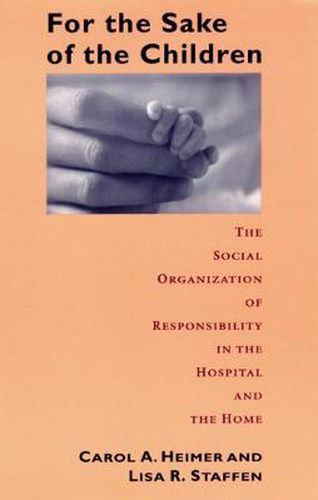Readings Newsletter
Become a Readings Member to make your shopping experience even easier.
Sign in or sign up for free!
You’re not far away from qualifying for FREE standard shipping within Australia
You’ve qualified for FREE standard shipping within Australia
The cart is loading…






This study examines the organization of social responsibility in the USA, in particular of critically ill newborn children. Drawing on medical records and interviews with parents and medical staff, the book investigates two neonatal intensive care units, showing the traumas of extreme medical measures, and the sufferings of infants. The accounts are by turns disturbing and heroic, as parents and staff attempt to take charge of the infants’ care, redefining their roles as adults and parents, and coping with sometimes awful contingencies. Rather than treating responsibility as an ethical issue, the book focuses on how responsibility is socially produced and sustained. It questions how staff members encourage parents to take responsibility, but keep them from interfering in medical matters, and how parents encourage staff vigilance when they are novices attempting to supervise the experts. The authors conclude that it is not sufficient simply to be responsible individuals. Instead, people must learn to be responsible in an organizational world, and organizations must learn how to support responsible individuals.
$9.00 standard shipping within Australia
FREE standard shipping within Australia for orders over $100.00
Express & International shipping calculated at checkout
Stock availability can be subject to change without notice. We recommend calling the shop or contacting our online team to check availability of low stock items. Please see our Shopping Online page for more details.
This study examines the organization of social responsibility in the USA, in particular of critically ill newborn children. Drawing on medical records and interviews with parents and medical staff, the book investigates two neonatal intensive care units, showing the traumas of extreme medical measures, and the sufferings of infants. The accounts are by turns disturbing and heroic, as parents and staff attempt to take charge of the infants’ care, redefining their roles as adults and parents, and coping with sometimes awful contingencies. Rather than treating responsibility as an ethical issue, the book focuses on how responsibility is socially produced and sustained. It questions how staff members encourage parents to take responsibility, but keep them from interfering in medical matters, and how parents encourage staff vigilance when they are novices attempting to supervise the experts. The authors conclude that it is not sufficient simply to be responsible individuals. Instead, people must learn to be responsible in an organizational world, and organizations must learn how to support responsible individuals.